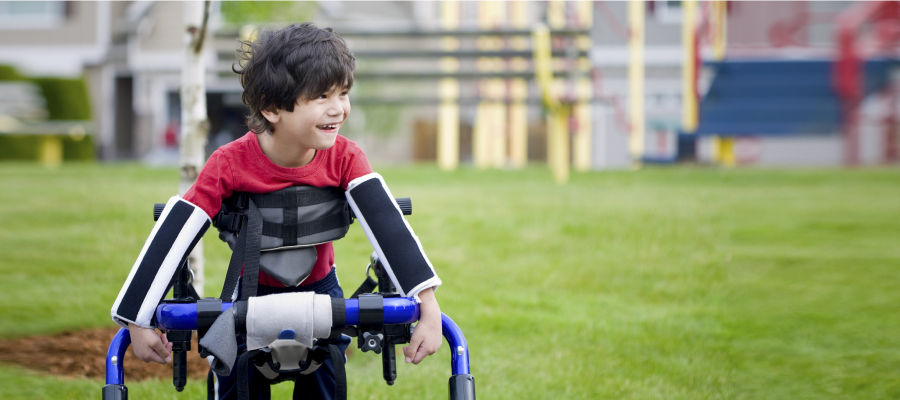Cerebral palsy refers to a group of disorders that affect a person’s ability to move and to maintain balance and posture. It is due to a non-progressive brain abnormality, which means that it does not get worse over time, although the exact symptoms can change over a person’s lifetime.
People with cerebral palsy have damage to the part of the brain that controls muscle tone. Muscle tone is the amount of resistance to movement in a muscle. It is what lets you keep your body in a certain posture or position, such as sitting up straight or keeping your head up. Changes in muscle tone also let you move. For example, to bring your hand to your face, the tone in your biceps muscle at the front of your arm must increase while the tone in the triceps muscle at the back of your arm must decrease. The tone in different muscle groups must be balanced for you to move smoothly.
There are four main types of cerebral palsy – spastic, athetoid or dyskinetic, ataxic, and mixed.
Spastic
People with spastic cerebral palsy have increased muscle tone. Their muscles are stiff and their movements can be awkward. Seventy to eighty percent of people with cerebral palsy have spasticity. Spastic cerebral palsy is usually described further by what parts of the body are affected. In spastic diplegia, the main effect is found in both legs. Spastic hemiplegia affects one side of the person’s body. Spastic quadriplegia affects a person’s whole body (face, trunk, legs, and arms).
Athetoid or dyskinetic
People with athetoid cerebral palsy have slow, writhing movements that they cannot control. These movements usually affect the hands, arms, feet, and legs. Sometimes the face and tongue are also affected, making it difficult to speak. Muscle tone can change from day to day and can vary even during a single day. Ten to twenty percent of people with cerebral palsy have the athetoid form of the condition.
Ataxic
People with ataxic cerebral palsy have problems with balance and depth perception. They might be unsteady when they walk. They might have difficulties with quick movements or movements that need a lot of control, like writing. They might have a hard time controlling their hands or arms when they reach for something. People with ataxic cerebral palsy can have increased or decreased muscle tone. Five to ten percent of people with cerebral palsy have ataxia.
Mixed
Some people have more than one type of cerebral palsy. The most common pattern is spasticity plus athetoid movements.
The symptoms of cerebral palsy vary from person to person. Symptoms can also change over time. A person with severe cerebral palsy might not be able to walk and might need lifelong care. A person with mild cerebral palsy, on the other hand, might walk a little awkwardly, but might not need any special help.
People with cerebral palsy can have other disabilities as well. Examples of these conditions include seizure disorders, vision impairment, hearing loss, and mental disabilities.
What causes cerebral palsy? Can it be prevented?
Cerebral palsy is caused by brain damage that affects a person’s ability to control his or her muscles. The part of the brain that is damaged determines what parts of the body are affected. There are many possible causes of the brain damage. Some causes affect how the baby’s brain develops during the first 6 months of pregnancy. These causes include genetic conditions and problems with the blood supply to the brain. Other causes of cerebral palsy happen after the brain has developed. These causes can occur during later pregnancy, delivery, or the first years of the child’s life. They include:
- bacterial meningitis and other infections
- bleeding in the brain
- lack of oxygen
- severe jaundice
- head injury
Babies who are born prematurely or who have very low birth weight (less than 1,500 grams or about 3 1/3 pounds) are more likely to have problems that might lead to cerebral palsy. However, full-term babies who have normal birth weight can also have cerebral palsy.
Some causes of cerebral palsy can be prevented. For example, bike helmets and car seats can prevent head injuries that might result in cerebral palsy. Another cause that can be prevented is kernicterus, a kind of brain damage that happens when a newborn baby has too much jaundice. In some newborn babies, the liver makes too much yellow pigment, called bilirubin. If too much bilirubin builds up in a new baby’s body, the skin and whites of the eyes turn yellow. This yellow coloring is called jaundice. A little jaundice is not a problem. It is actually very common in newborn babies and usually goes away by itself. Some babies, however, have too much jaundice. If not treated, these high levels of bilirubin can damage a baby’s brain. Kernicterus most often causes cerebral palsy and hearing loss, but in some children it can also cause mental retardation. Kernicterus can be prevented by using special lights (phototherapy) or other therapies to treat babies.
Cerebral palsy cannot be cured. Treatment can, however, help a person take part in family, school, and work activities as much as possible. There are many treatments, including physical therapy, occupational therapy, medicine, operations, and braces
